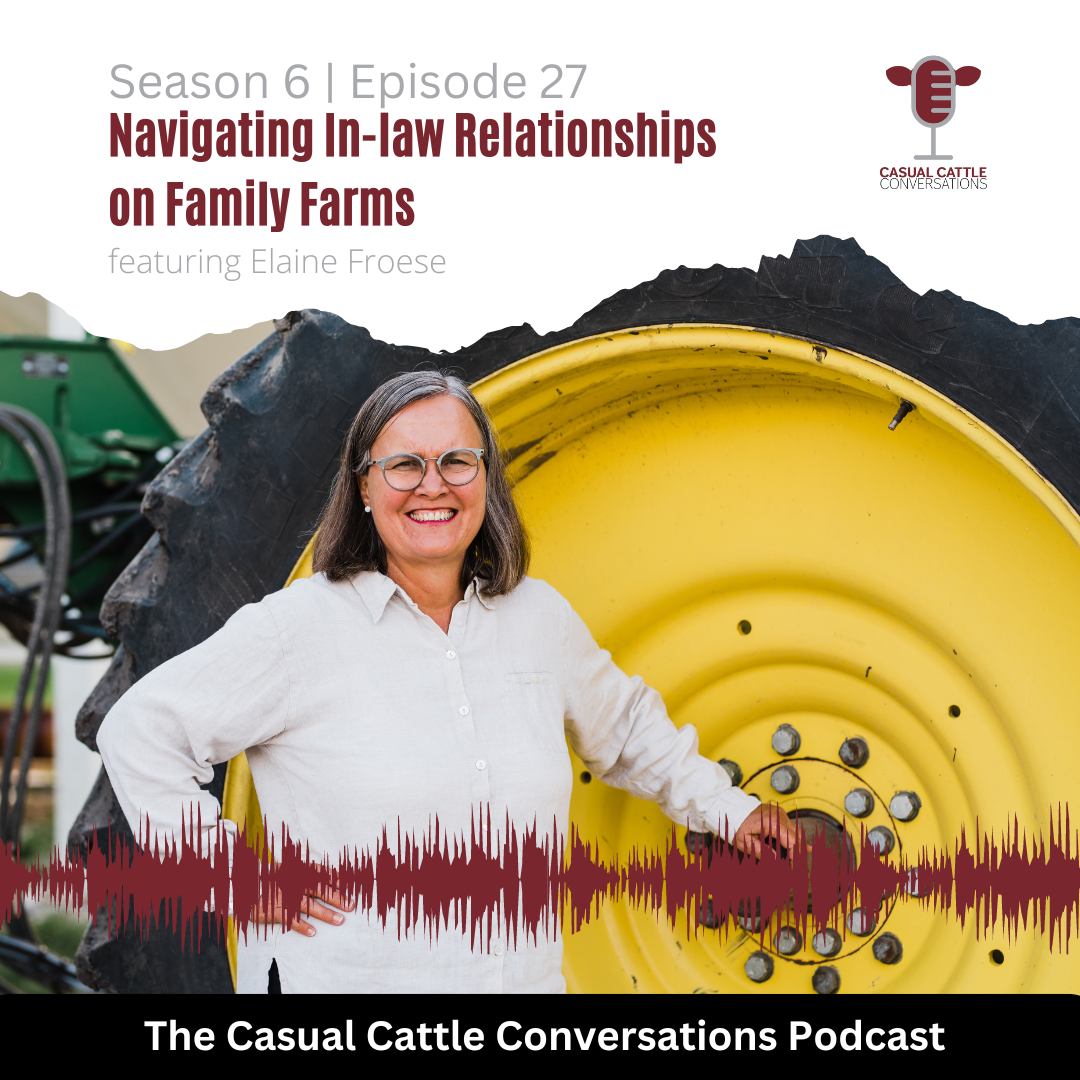Navigating In-law Relationships on Family Farms

Are you avoiding important conversations to avoid conflict?
Important conversations are meant to be had not avoided. Yet, as humans, we will do a lot to avoid anything that may stir the pot…well, maybe some of us like to do a little stirring, but that’s beside the point. I want you to think about which conversations you are avoiding and ask yourself this question.
By not having this conversation, are the potential conflicts greater or less than having it?
Which would you rather live with? Elaine Froese shares some key phrases to use such as “by when” and “I’m curious” in this week’s podcast episode to help you phrase these conversations.
Navigating In-law Relationships on Family Farms
When we think of family farms, we often think about the side of the family that continues to pass the farm or ranch down to the next generation. But what about the family members who marry in and add value to the business in their own unique ways? Elaine Froese – Farm Family Coach – shares how family members can work together to build strong in-law and family relationships while farming and ranching together. Elaine offers tips for how to understand family culture, set boundaries and start having conversations about transition planning.
Family Culture
Each family has a unique culture based on what they believe, how they behave and how they make decisions.
“When you are trying to understand the family culture, ask yourself these three questions: what do I believe to be true, how do we behave towards each other and how do we make decisions about the farm or ranch?” says Froese.
Understanding family culture and having a strong foundation as a family are vital components of having a successful family business.
If you are questioning if you have a healthy family relationship, Froese recommends checking in with yourself first by being real about your mental well-being and determining if you are able to put yourself in the shoes of others. Listening to podcasts, reading articles and taking time to learn what is healthy behavior is also an important part of knowing how strong your family foundation is or is not.
“You get the behavior you accept,” says Froese.
Setting Boundaries, Compensation & Respecting Skillsets
Setting boundaries is a part of all relationships in life, yet it can be overlooked. When thinking about how you will be involved on your family operation, think about the boundaries that need to be set so that you are compensated and can enjoy the work you are doing.
“Cattle ranchers know the value of strong fences and good gates. They need to place this value on their boundaries too,” says Froese.
Froese recommends starting this process during the dating phase of your relationship. If you are dating someone, observe how they interact with their family and what their current boundaries are for work, personal life and family. Is this what you want? You also need to be mindful that you aren’t yielding to your own family or in-laws by always saying yes when you truly want to say no because it is crossing a boundary. Be honest and open about your boundaries early on to avoid future conflicts.
Compensation and money can create conflict within a family. Setting a boundary around them early on helps avoid future conflicts. The senior generation needs to be transparent about the financials of the family business and share that with the rising generation. This allows the rising generation an opportunity to find outside income if they need it to create their own personal wealth.
“What I see on family ranches is that people are not paying themselves enough to live comfortably and create wealth. A young couple with a few kids needs to be paying themselves $70,000 to $84,000 per year,” Froese says.
Make sure both spouses understand farm and ranch finances, good and bad debt and don’t make any assumptions about what one does or does not understand.
“A clear financial plan that compensates everyone well, needs to be created,” Froese adds.
Utilizing everyone’s skillsets in the best manner is also a key component of reducing conflict within families. Froese recommends taking the personal style analysis found on her website and sharing these results with all family members. Knowing everyone’s strengths and weaknesses and assigning roles accordingly will allow each person to enjoy their work and natural boundaries to be formed. This also opens up conversations and opportunities for family members to learn about other parts of the business that they don’t yet understand and need to learn before things get passed on.
Start Having the Conversations
Conversations about the bull in the room are not meant to be avoided.
“Procrastination and conflict avoidance are killing agriculture,” Froese says.
However, there are a few strategies you can utilize to make the process easier. Froese recommends approaching the conversation with curiosity and attacking the problem and not the people. This removes any blame and makes everyone more at ease.
Froese also encourages family members to use outside coaches and mediators to keep these conversations on track and structured. If you are having some anxiety about a lack of a plan and lack of communication between in-laws and generations, Froese says to use the “by when” phrase.
Ask the senior generation, “By when can we work with someone to create a transition plan?” “By when can I sign a contract that outlines my role and compensation as an employee?”
At the end of the day, the best thing you can do is be grateful for the opportunities you’ve had thus far and express that thankfulness to all parties involved. While talking about the bull in the room isn’t always easy, avoiding it won’t get families anywhere either. Take a deep breath. Be thankful and approach conversations with curiosity.
Click the photo below to listen to the whole conversation:








